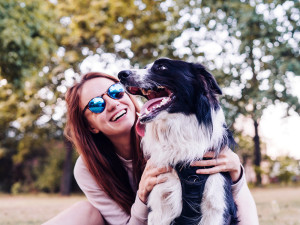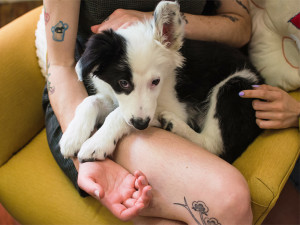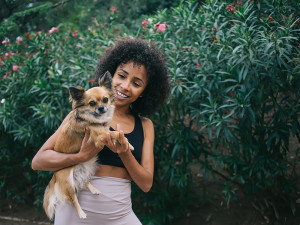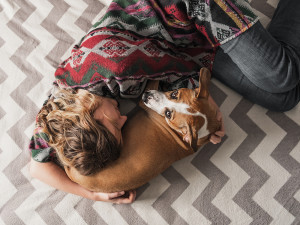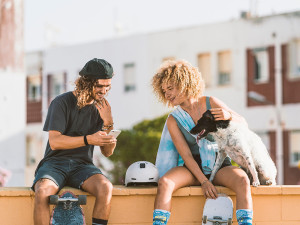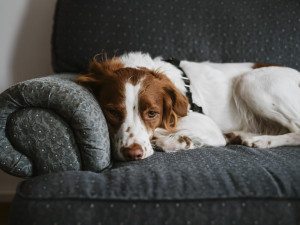Can Dogs Feel Guilt?
They do look very sorry...

share article
In This Article:
Dogs’ Emotional Intelligenceopens in a new tab Can Dogs Sense When You're Sad?opens in a new tab How Dogs Respond to Human Emotionsopens in a new tab The Canine-Human Bondopens in a new tab
Picture this: You walk through the door after a long day, only to find the trash strewn across the floor and your dog hiding in the corner — ears back, tail tucked, the whole shebang. It’s that classic “oops, I did it again” expression that might have you believing your dog is feeling the weight of their misdeeds.
In fact, most pet parents believeopens in a new tab that dogs know when they’ve done something wrong and display that “guilty look” as a result. But while some dog behaviors may look like guilt, current scientific understanding suggests that dogs may not experience true guilt as humans do (lucky, aren’t they?). Instead, they often react to their pet parent's disapproval based on learned cues, such as tone of voice or body language.
You’re reading that correctly: You’re likely the problem, or at least a part of it. Let’s unpack the mystery behind those guilty expressions and explore the fascinating science behind canine emotions.
The science behind whether or not dogs feel guilt
Conducting studies about dog emotions can be difficult, because we’re not dogs and can’t really understand what they’re feeling. We can only base our hypotheses on observable behaviors and physiological responses.
This means researchers often rely on a combination of behavioral observations, neuroscientific data, and anecdotal evidence from pet parents to piece together our understanding of canine emotions. While it’s not a perfect science, these methods offer valuable insights into the rich inner world of our beloved four-legged companions.
Canine emotions: What research tells us
Despite the convincing guilt look your pup flashes you when they’ve done something they shouldn’t have, they don’t actually feel guilt. One study revealsopens in a new tab that dogs show this look of guilt in response to being scolded by their pet parent. It even found that dogs don’t show the “guilty look” when their parent refrains from scolding them. So, the scolding and the guilty look are clearly connected.
Limitations in interpreting dog emotions
We now know that many pet parents think their dog knows they’ve done something wrong and displays guilty behavior as a result. But research finds opens in a new tabthat this way of thinking is potentially problematic, because there is currently no unanimous agreement among scientists regarding the appropriateness of attributing emotional comprehension or experiences to animals.
“Nobody can know what an animal is feeling, but dogs tend to respond more to your behavior and their ability to predict what your behavior is going to be,” says Robert Haussmann, Certified Trainer, Canine Behavior Consultant, and Co-Founder of Dogboy NYCopens in a new tab. “They use appeasement behavior such as paw lifting and putting their ears back in response to or anticipation of your actions, and it’s easy for us to anthropomorphize that into guilt.”
Essentially, we’re assigning human behaviors to non-human beings, and there’s no scientific evidence that we should be doing that…like, ever.
Why does my dog look guilty?
Put simply, dogs look guilty because they’re responding to our behavior. If they know we scold them and get upset when they've done something wrong, they may exhibit behaviors that we interpret as guilt.
“The thing that also comes after a dog does something that we don’t like is our behavior,” Haussmann explains. “If every time we come in and react in anger when they misbehave, they’ll try to de-escalate the situation by offering appeasement behavior. They may even engage in appeasement behavior proactively because they can predict that we’re going to freak out about something.”
Appeasement behavior in response to human scolding is their way of trying to diffuse any tension and make amends. It’s like they’re saying, “Let’s bury the bone and move on from this little mishap, okay?” They give these appeasement signals through their body language, which is crucial to understanding canine behavior.
Understanding dog body language
When it comes to that infamous guilty look, understanding dog body language is the key to unlocking the mystery. That pitiful puppy-eyed expression isn't necessarily a sign of genuine guilt, but more often a display of appeasement behavior.
Dogs are masters at reading our emotions, so when they see us frowning or hear the sharp tone of our voice after discovering the trash scattered across the living room floor, they instinctively respond with behaviors like avoiding eye contact, cowering, or even offering a submissive grin. Learning to interpret these subtle cues helps us better understand our canine companions and strengthens the bond we share with them.
Common behaviors that resemble guilt
We’ve all caught our dogs red-handed, only to be met with a series of adorable yet suspicious behaviors. Here are some common behaviors that will likely have you second-guessing your pup's innocence:
Hiding or avoidance: Your dog may retreat to a hiding spot or avoid making eye contact with you altogether (#awkward). This behavior suggests that they're trying to escape the situation or potential consequences of their actions.
Low body posture: Your dog may lower their body close to the ground, almost as if they're trying to make themselves appear smaller. This submissive stance is a classic appeasement behavior.
“Puppy Eyes”: You know that irresistible look your dog gives you, with big, soulful eyes? While it may seem like an expression of guilt, it's often just a natural response to your emotions. Dogs use their eyes to communicate, and those puppy-dog eyes can be a way of seeking reassurance or attention.
Lifting a paw: Some dogs may lift one of their front paws in a gesture of submission or uncertainty. This action can signal that they're unsure how to react to your disapproval or that they're trying to avoid further conflict.
Tucked tail: A tucked tailopens in a new tab is a classic sign of fear or anxiety in dogs. When they've done something wrong, they may tuck their tail between their legs as a display of submission or to protect themselves from perceived threats.
Ears pulled back: Dogs often pull their ears backopens in a new tab close to their heads when they're feeling anxious or submissive. This behavior can indicate that they're trying to avoid confrontation or appease you after realizing they’ve misbehaved.
The role of training and reinforcement
Training our dogs isn't just about teaching them cool tricks like rolling over or playing dead. It also plays a crucial role in shaping their behavior and preventing those guilty looks that often leave us scratching our heads. By using positive reinforcement techniques and consistent training, we can help our dogs understand what's expected of them and build a strong bond based on trust and communication. But before you do that, it’s important to get your thinking right about the situation and do some training of your own.
“The first thing you need to do is uncouple the dog’s behavior from our own sense of right and wrong,” Haussmann explains. “If you come in and the dog looks guilty, it’s possible that you might be freaking your dog out and you need to check your own behavior. For example, if your dog grabs some food off the counter, try not to outwardly punish or scold your dog.”
One way to do this is to teach them cues such as “down” and “stay,” so they know your expectations and what is and is not appropriate behavior. Prevention, Haussmann says, is another important aspect of behavior management that is often overlooked as a training solution. Block them off from the kitchen while you’re cooking so they don’t snag food off the table, or if your dog always gets into the garbage, consider getting a garbage can with a lid.
“Proactive management and training are the best solutions to preventing unwanted behaviors,” Haussmann explains. “If you get the guilty look, that means there’s a good chance your dog is responding to your behavior, and you should adjust that.”
FAQs (People also ask):
Do dogs know when you’re mad at them?
Most likely, yes. Dogs are highly attuned to our emotions and body language, so they can often sense when we're upset or angry. However, their understanding may not be as nuanced as a human’s, and they may interpret our anger as a change in our behavior rather than understanding the specific reason behind it.
Do dogs understand accidents?
No, dogs don't understand accidents in the same way humans do, but they can learn from the consequences of their actions. With consistent training and reinforcement, dogs can learn appropriate behavior and reduce the likelihood of accidents in the future.
Can dogs feel embarrassed?
While dogs may exhibit behaviors that resemble embarrassment, such as avoiding eye contact or slinking away, it's unlikely that they experience the complex emotion of embarrassment in the same way humans do. These behaviors are more likely a response to their perception of our reactions rather than a true sense of embarrassment.
Do dogs know when they are in trouble?
Yes, dogs can learn to associate certain actions with negative consequences, such as being scolded or punished. They may display behaviors like avoidance or submissive postures when they sense they've done something wrong, but their understanding may be more instinctual than conscious.
Is it possible for a dog to learn to mimic guilt to gain attention or avoid punishment?
Yes, dogs are masters of reading human behavior and learning how to manipulate situations to their advantage. While they may not feel guilt in the same way humans do, they can learn that certain behaviors, such as looking guilty, result in attention or avoiding punishment.
References:
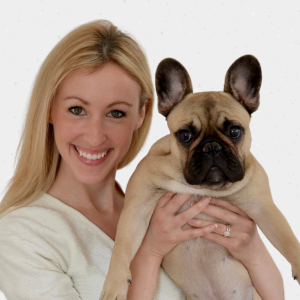
Courtney Elliott
Courtney Elliott, a proud Cleveland native living in Manhattan, blends her decade of writing and editing expertise with her unshakable devotion as a pet parent to her French Bulldog, Gus. When she’s not at her desk, you’ll find her frolicking in Central Park or engrossed in a good book at a local coffee shop.
Related articles
![Young woman playing with a dog outdoors stock photo.]() opens in a new tab
opens in a new tabDo Dogs Try and Make Us Laugh? The Internet Thinks So — Here’s What Science Says
If you think your pup’s practically George Carlin, science backs you up.
- opens in a new tab
Do Anxious Dog Parents Raise More Anxious Dogs?
Which comes first: a nervous person or a nervous pup?
![Happy young woman in yoga clothes holding small tan dog in park]() opens in a new tab
opens in a new tabThe Healthiest Thing You Can Do Is Get a Dog, Harvard Report Says
Scientists confirm the myriad physical and psychological benefits of pet parenthood.
![A woman laying on a zig zag patterned blanket while curling around her brown and white dog]() opens in a new tab
opens in a new tabHow to Register an Emotional Support Animal
Confused about ESA rules? Here’s a comprehensive guide that explains everything you need to know about emotional support animals registration.
![two people bonding and smiling over a dog]() opens in a new tab
opens in a new tabLoneliness Is a Public Health Crisis. Pets Can Help
Per the US Surgeon General, loneliness is as dangerous for your health as smoking 15 cigarettes a day. Here are ways pets can solve that.
![Australian shephard and Corgi mix play fighting outside]() opens in a new tab
opens in a new tabHow to Recognize the Signs of Dog Aggression
A PSA to pay better attention to our best friends’ body language.
![A dog laying on a couch looking relaxed]() opens in a new tab
opens in a new tabIs Your Dog Sad?
Or are they just peacefully resting? Behaviorist Karen London explains how to tell the difference.
